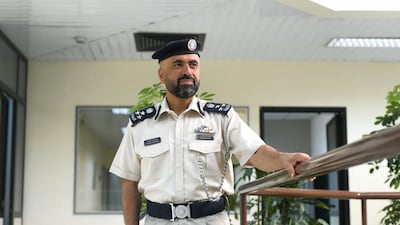A senior Abu Dhabi Police officer warned cyclists of the dangers of flouting traffic rules after a group of eight riders were hit by a car while travelling on the hard shoulder of a motorway.
At least two of the cyclists are understood to have needed hospital treatment after the crash on Yas Island at about midnight on Thursday.
There were 109 cycling crashes in the past two years, which is 4 per cent of the total road crashes during the period.
Some of the group that were hit on Thursday were not wearing wear high-visibility clothing at the time.
Brig Gen Salem Al Dhaheri, the emirate's deputy traffic chief, said cyclists and e-scooter riders were placing themselves at risk by ignoring regulations.
"It is illegal for any unlicensed vehicle to be on the street with regular cars outside designated lanes and crossings," he said.
“Riding on the hard shoulder is not allowed either. This lane is only for emergency cases.
“We don’t allow unlicensed cars to drive on the street because how would we know if they are fit to be on the road? The same applies for bikes and scooters.”
Cyclists face fines if they are found riding on main roads alongside licensed vehicles.
“Cyclists and e-scooter riders are expected to follow pedestrian traffic signals, lanes and crossings when no designated lane is available on the street. They could also ride on the pavement,” Brig Gen Al Dhaher said.
Abu Dhabi is pressing ahead with plans to integrate cycling tracks on all the emirate's streets.
But until the ambitious project is complete, "cyclists should never be on the street with cars", Brig Gen Al Dhaheri said.
If a cycling track ends abruptly because of construction work or being incomplete, cyclists are expected to turn back.
When cycling lanes are cut off by construction work, a detour is often provided on the pedestrian walkways or an alternative designated area on the street, the officer said.
"I am a cyclist myself since the age of 12 and when I ride from my home to a nearby cycling track I feel how risky it is to be on the street if I were not on the designated lane," Brig Gen Al Dhaheri said.
"At Abu Dhabi Police we have been encouraging people to take up cycling for many reasons; to have a variety of transport methods to ease congestion on the roads, and to limit carbon emissions for the environment," he said.
“The sport helps in improving one’s health and prevents obesity.”
But the officer insisted that cyclists must adhere to the law to remain safe.
He said all cyclists should wear a helmet, arm and knee pads, install a white front light, a red rear light and a reflective number plate to make themselves visible to drivers on the roads.
Brig Gen Al Dhaheri said riders should cycle in designated lanes and areas, be cautious not to hit pedestrians on pavements and must not load their bikes because they can lose balance.
“There have been road deaths involving cyclists getting run over, and severe injuries for e-scooter riders as well,” he said.
More than 30 per cent of road deaths involved victims being run over.
“So we cannot stress enough how important it is to ride in designated areas,” the deputy chief said .


